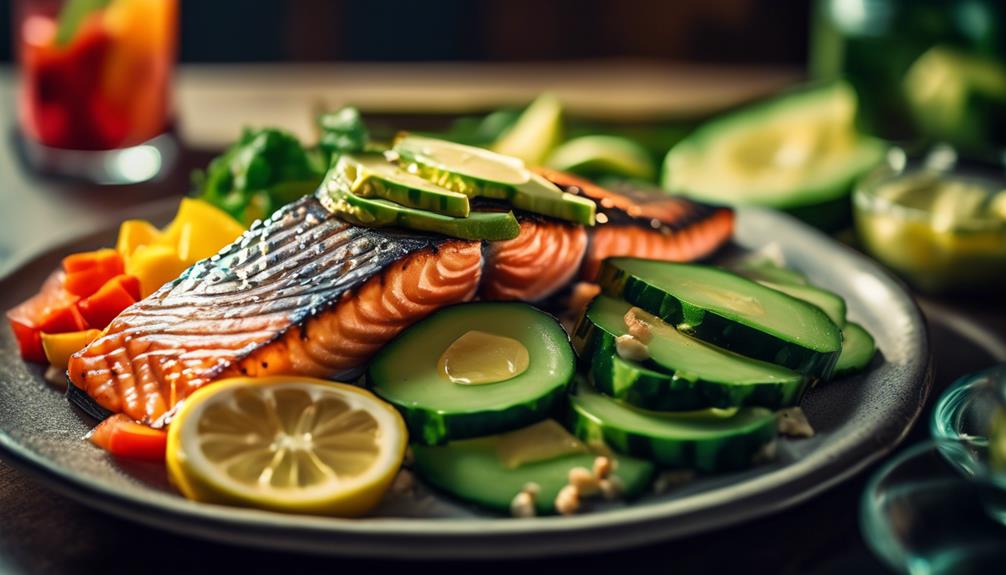Imagine a world where your body is free from the grips of inflammation, where you wake up feeling refreshed and energized, ready to tackle the day ahead.
The good news is, with the ketogenic diet, this world can become your reality. By making a few simple adjustments to your eating habits and lifestyle choices, you can effectively reduce inflammation and improve your overall well-being.
So, are you ready to discover the six best ways to achieve this on the keto diet? Let's dive in and unlock the secrets to a healthier, inflammation-free life.
Incorporate Anti-Inflammatory Foods

Incorporate anti-inflammatory foods into your keto diet to help reduce inflammation and promote overall health.
When following a ketogenic diet, it's important to choose foods that not only support your weight loss goals but also have anti-inflammatory properties. Certain herbs and supplements have been shown to possess healing properties and can aid in reducing inflammation.
One powerful healing herb is turmeric, which contains curcumin, a compound with potent anti-inflammatory effects. Incorporating turmeric into your meals or taking a curcumin supplement can help alleviate inflammation in your body.
Another beneficial herb is ginger, which has been used for centuries to treat various ailments, including inflammation. Add fresh ginger to your dishes or enjoy a cup of ginger tea to reap its anti-inflammatory benefits.
In addition to herbs, certain supplements can also help combat inflammation. Omega-3 fatty acids, found in fish oil supplements, have been extensively studied for their anti-inflammatory properties. Consider including an omega-3 supplement in your keto diet to help reduce inflammation.
Adjust Macronutrient Ratios
Adjusting macronutrient ratios is an important aspect of the keto diet that can help optimize your results and reduce inflammation.
One key factor to consider is your protein intake. While protein is essential for muscle growth and repair, excessive consumption can lead to an increase in insulin levels and hinder your progress on the keto diet. To strike the right balance, aim for an optimal protein intake of around 20-25% of your daily caloric intake.
Another strategy to consider is carb cycling. This involves alternating between higher and lower carbohydrate days. On high carb days, you can increase your carbohydrate intake to replenish glycogen stores and support physical performance. On low carb days, you restrict your carbohydrate intake to promote ketosis and maximize fat burning. By incorporating carb cycling into your keto diet, you can provide your body with the necessary nutrients while still maintaining the metabolic benefits of ketosis.
It's important to note that the optimal macronutrient ratios may vary depending on your individual needs and goals. Consulting with a healthcare professional or registered dietitian can help you determine the best macronutrient ratios for your specific situation.
Practice Intermittent Fasting

To further enhance the benefits of the keto diet and continue reducing inflammation, consider incorporating intermittent fasting into your routine. Intermittent fasting involves cycling between periods of eating and fasting, and it has been shown to have numerous benefits for overall health and inflammation reduction.
Here are some key reasons why you should consider practicing intermittent fasting:
- Benefits of time restricted eating: By limiting your eating window to a specific time period each day, such as 8 hours, you give your body a chance to properly digest and process the food you consume. This can help regulate insulin levels, improve metabolic function, and reduce inflammation.
- Role of autophagy in reducing inflammation: Autophagy is the process by which your body breaks down and recycles old or damaged cells. Studies have shown that intermittent fasting can stimulate autophagy, which can help reduce inflammation by removing inflammatory cells and promoting cellular repair.
- Enhanced fat burning: When you fast, your body depletes its glycogen stores and starts burning fat for fuel. This can lead to weight loss and a reduction in adipose tissue, which is a major source of inflammation in the body.
Incorporating intermittent fasting into your keto routine can provide additional benefits for reducing inflammation and improving overall health. However, it's important to listen to your body and consult with a healthcare professional before starting any new dietary regimen.
Increase Omega-3 Fatty Acids Intake
Increasing your intake of omega-3 fatty acids can be beneficial for reducing inflammation and improving overall health. Omega-3 fatty acids are essential fats that play a crucial role in reducing inflammation in the body.
One of the best ways to increase your omega-3 intake is by consuming fish, particularly fatty fish like salmon, mackerel, and sardines. These fish are rich in eicosapentaenoic acid (EPA) and docosahexaenoic acid (DHA), two types of omega-3 fatty acids that have been shown to have anti-inflammatory properties. Aim to include fish in your diet at least two to three times a week.
If you're not a fan of fish or find it difficult to incorporate it into your meals, you can also consider taking high-quality omega-3 supplements. Look for supplements that are derived from fish oil and have been tested for purity and quality. The recommended dosage of omega-3 supplements varies, but generally, aim for a total daily intake of at least 1,000-2,000 mg of EPA and DHA combined.
Increasing your omega-3 fatty acids intake through fish consumption or supplements can help reduce inflammation and improve overall health. However, it's important to note that omega-3 fatty acids should be part of a well-balanced diet and lifestyle, along with other anti-inflammatory practices, to effectively manage inflammation.
Minimize Consumption of Processed Foods

To continue promoting a diet that reduces inflammation, it's important to be mindful of your consumption of processed foods. Processed foods are typically high in added sugars, unhealthy fats, and low in essential nutrients. By minimizing your intake of processed foods, you can significantly reduce your sugar intake and increase your fiber consumption, both of which are key factors in reducing inflammation.
Here are three reasons why minimizing processed foods is crucial for reducing inflammation:
- Reduced sugar intake: Processed foods often contain high amounts of added sugars, which can lead to chronic inflammation. Consuming excessive amounts of sugar can trigger the release of pro-inflammatory cytokines, contributing to inflammation in the body. By cutting back on processed foods, you can significantly reduce your sugar intake and help alleviate inflammation.
- Increased fiber consumption: Processed foods are typically low in fiber, a nutrient that plays a crucial role in reducing inflammation. Fiber helps regulate blood sugar levels, promotes healthy gut bacteria, and aids in the removal of toxins from the body. By opting for whole, unprocessed foods that are rich in fiber, such as fruits, vegetables, and whole grains, you can increase your fiber consumption and support an anti-inflammatory diet.
- Avoidance of harmful additives: Processed foods often contain additives such as artificial sweeteners, preservatives, and trans fats, which can contribute to inflammation. These additives have been linked to various health issues, including an increased risk of chronic diseases and inflammation. By minimizing your consumption of processed foods, you can avoid these harmful additives and promote a diet that reduces inflammation.
Manage Stress Levels Effectively
Managing stress levels effectively is essential for reducing inflammation and promoting overall health. Chronic stress has been linked to increased inflammation in the body, which can lead to a variety of health issues. Fortunately, there are several stress reduction techniques and mindfulness practices that can help you manage stress effectively.
One effective stress reduction technique is deep breathing exercises. Taking slow, deep breaths can help activate the body's relaxation response and reduce stress levels.
Mindfulness meditation is another powerful tool for managing stress. By focusing on the present moment and observing your thoughts and emotions without judgment, you can cultivate a sense of calm and reduce stress.
Regular exercise is also crucial for stress management. Engaging in physical activity helps release endorphins, which are natural stress fighters. Whether it's going for a walk, practicing yoga, or hitting the gym, finding an exercise routine that you enjoy can be an effective way to manage stress.
In addition to these techniques, it's important to prioritize self-care and engage in activities that bring you joy and relaxation. This could include hobbies, spending time with loved ones, or practicing self-care rituals such as taking a bath or reading a book.
Conclusion
By incorporating anti-inflammatory foods, adjusting macronutrient ratios, and increasing omega-3 fatty acids intake, you can significantly reduce inflammation with the keto diet.
Practicing intermittent fasting, minimizing consumption of processed foods, and managing stress levels effectively are also key factors in reducing inflammation.
This evidence-based approach offers a concise and informative way to improve your health and well-being.
Take control of your inflammation and experience the transformative power of keto today.







